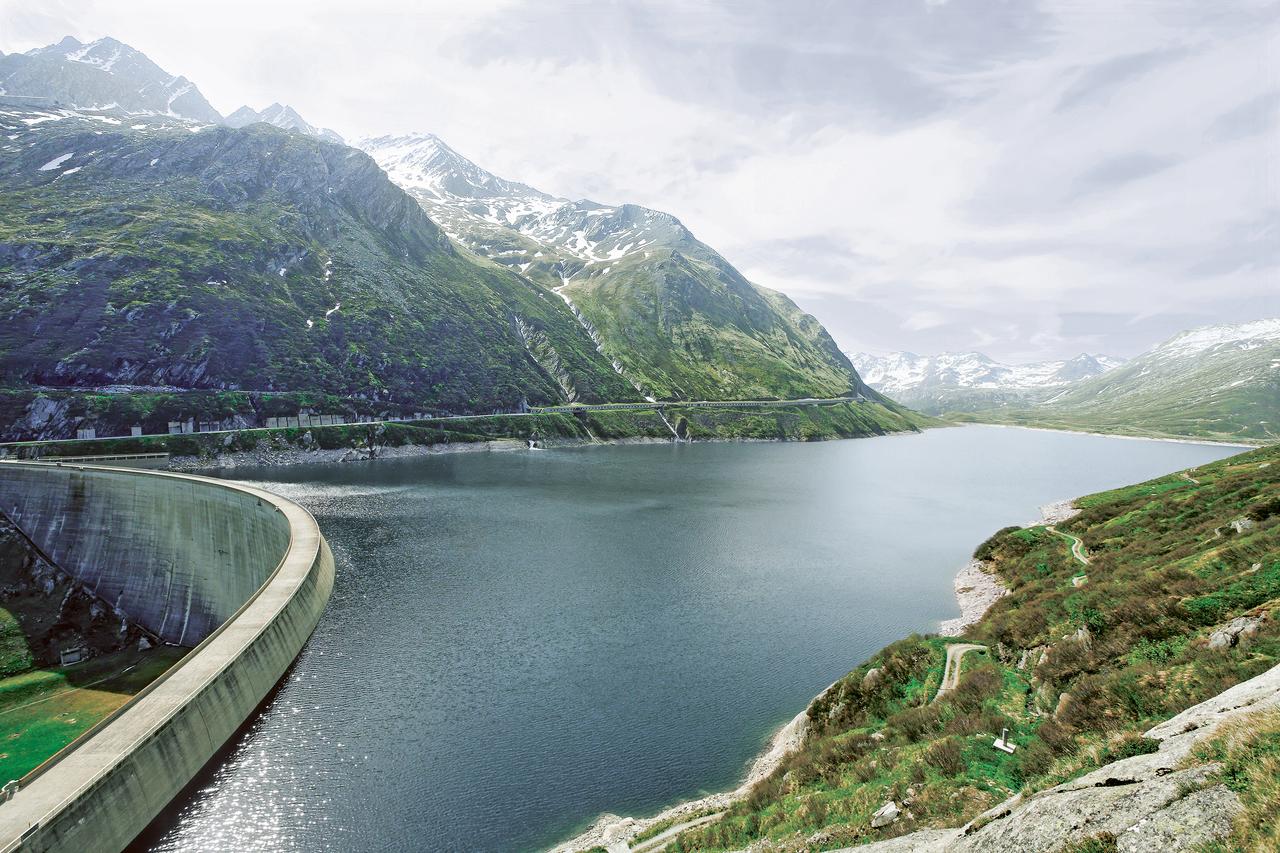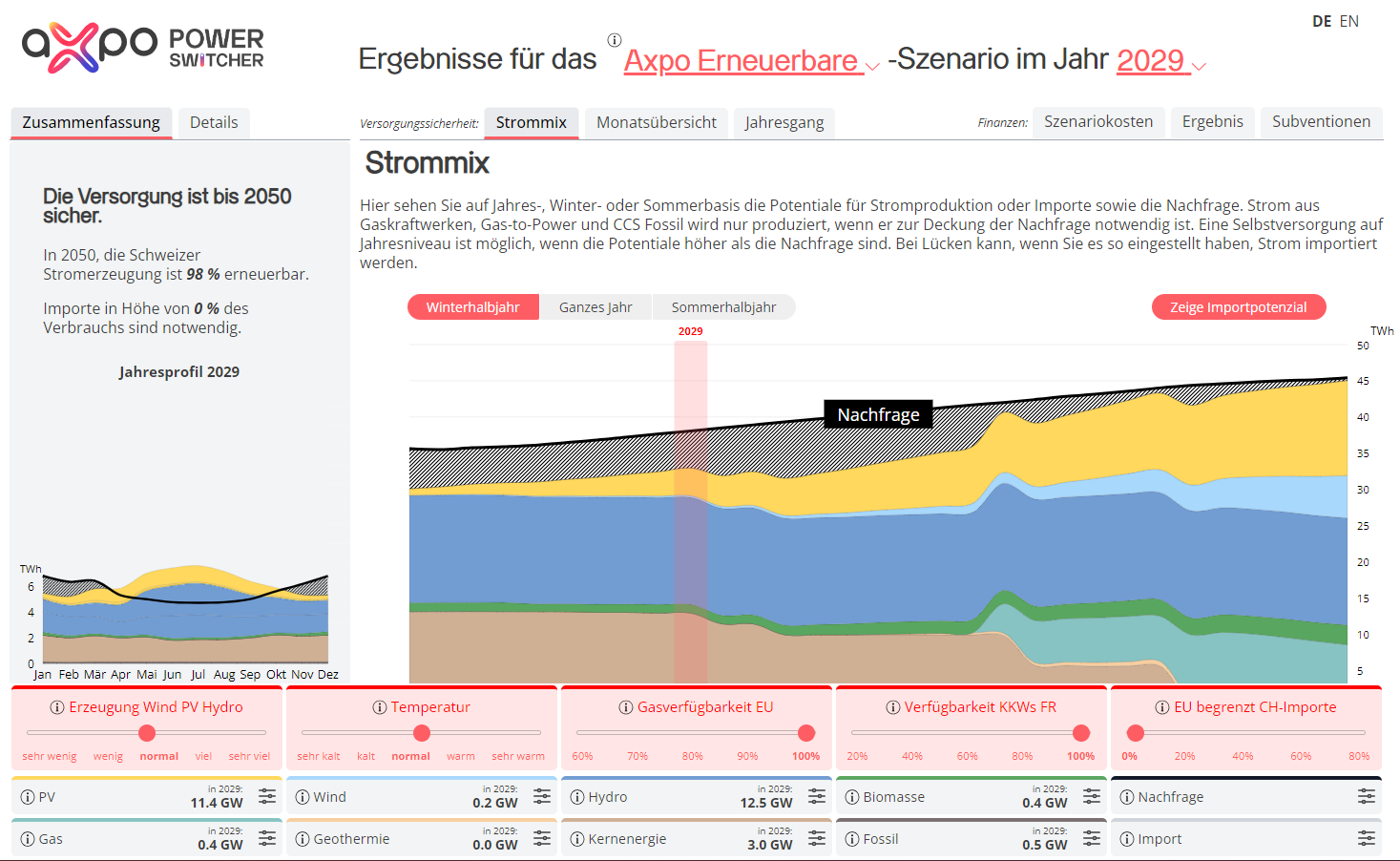17.03.2023 | Mantelerlass: after the National Council, a mixed picture emerges
More Renewables, More Regulation
The Federal Act on a Secure Electricity Supply with Renewable Energies sets the course for the future Swiss electricity market and the expansion of renewable energies. Following decisions by the Council of States and National Council, the picture is mixed. On the one hand, there are positive signals, but on the other there is still room for improvement. The following is Axpo’s assessment of the situation.
After the Council of States adopted numerous amendments to the Federal Council's version of the Act in autumn 2022, the National Council dealt with the so-called Mantelerlass from 13 to 15 March 2023. The decisions taken by the National Council are summarised and discussed below.
National Council wants to drive forward the expansion of renewable energies
The National Council wants a rapid expansion of renewable energies in Switzerland. Like the Council of States, it has set expansion targets for renewable energies, excluding hydropower, at 35 TWh by 2035, which corresponds to slightly more than half of Switzerland's current electricity consumption or double the Federal Council's target.
This increase is to be achieved firstly by strengthening the national interest in the expansion of renewable energies, which should now take precedence over conflicting cantonal, regional and local interests. The cantons are to designate areas for solar installations of national interest in their structure plans. In contrast to the Council of States, the National Council wants to maintain the ban on installations in biotopes of national importance and water and migratory bird reserves, but provide for exceptions for glacier forelands and alpine alluvial plains. Finally, solar, wind power and biomass plants should also be able to obtain exemption permits outside the building zone under certain conditions.
A second, important element of this expansion is the subsidy instruments that have already been introduced and adapted with the Pa. Iv. Girod. Like the Council of States, the National Council has supplemented existing instruments with the so-called sliding market premium. In addition, a uniform minimum redelivery remuneration for small producers of renewable energy is to be introduced throughout Switzerland. This represents an additional subsidy that is borne by basic supply consumers. Financing of other support instruments is to be strengthened by the possibility of drawing on the grid surcharge fund, through adjustments proposed by the National Council.
Thirdly, as a complement to the Council of States, the National Council would like to focus on obligations. For example, all new buildings and significant conversions of existing buildings are to be equipped with solar energy systems. A corresponding obligation should also apply to larger car parks from 2030.
Finally, the National Council approved a controversial proposal to suspend stricter residual water regulations for new concessions until 2035.
Hardly any positive aspects for winter electricity
Like the Council of States, the National Council also wants a guideline value for the maximum dependence on imports and the addition of 6 TWh of winter electricity. However, it has weakened the instruments necessary to achieve this target. Firstly, only Round Table on Hydropower winter electricity projects will benefit from the additional easing of licensing procedures, not solar or wind power plants. Specific support for prioritised plants envisaged by the Council of States was also removed. Secondly, the National Council rejects incentives for winter electricity as part of the sliding market premium. According to the Council of States, these operators would have been able to keep part of the additional income in winter.
Regarding domestic electricity shortages, the energy reserve (expansion of the hydropower reserve) is set in law. However, instead of a market-based solution, the National Council is relying on a disproportionate, general obligation on operators to hold part of their storage lakes in reserve in return for an administratively fixed remuneration.
No complete market opening, but additional regulations for suppliers
Like the Council of States, the National Council rejects the complete opening of the electricity market. As a result, small consumers will not be able to choose their electricity supplier in future. One exception is the planned introduction of so-called local energy communities, in which consumers can purchase electricity produced by other members and benefit from a reduced grid tariff. At the same time, the National Council wants to oblige suppliers to cover the electricity for their basic supply end consumers primarily through their own renewable production at production costs or procure a minimum share of it on a long-term basis. In doing so, suppliers must offer a standard product with exclusively renewable energies. They are also obliged to reduce the electricity consumption of their customers through efficiency measures, according to a specified reduction path. Suppliers will receive tradable certificates for the reduction targets they achieve; failure to achieve them will result in sanctions. From the electricity industry’s point of view, the market is being opened up in the wrong place, namely in the area of metering, where additional interfaces are being created through partial standardisation.
Adjustments were also decided regarding the partial solidarity of grid connection and grid reinforcement costs, the exemption of storage facilities and certain electrolysers from the grid usage fee, and as well as with regard to the use of grid flexibility.
Assessment and outlook
Following the decisions of the Council of States and National Council, the picture is somewhat mixed. In particular, the positive signals for renewable energies and improvements regarding their licensability are to be welcomed. At the same time, however, a stronger focus on winter electricity would have been desirable, and the National Council's decisions lack a follow-up solution for alpine PV systems. The opportunity was also missed to set the framework conditions for innovation and market-oriented behaviour with the complete opening of the market. Instead, additional regulatory instruments are being used (including procurement requirements and efficiency obligations for suppliers), which will probably impose a considerable administrative burden and ultimately higher costs for Swiss end consumers.
Next, the Energy Commission of the Council of States will take up the bill again. In view of the coming discussions, the following aspects should be considered:
- Even if they are deemed to be of national interest, large-scale electricity production plants have a difficult time balancing their interests against numerous and sometimes very specific protective provisions. What is needed is a balancing of interests that is appropriate to energy policy goals; restrictions or bans, on the other hand, should be rejected.
- There is an urgent need for sustainable acceleration and coordination of the approval procedures for renewable electricity production plants and grids, which are not currently covered by the overarching decree.
- It must be ensured that the economic viability of projects that are important for the security of supply is strengthened through appropriate funding. Investments to shift electricity production from summer to winter do not benefit from additional production or a high price level, but only from seasonal price differences.
- The obligation for storage operators to hold a part of their energy volume in reserve reduces the incentives to invest in corresponding projects. Interference in the guarantee of property and economic freedom generally damages the investment climate and is associated with inefficiencies.
- The possible benefits of additional regulatory measures such as efficiency requirements for suppliers or the partial liberalisation of metering must be set against the potentially very high administrative costs and the uncertainty this would create.
The Council of States would be well advised to consistently align the Mantelerlass with the ambitious targets for renewable energies in the detailed consultations. However, the Council will also have to take into account that measures such as the temporary suspension of the current, stricter residual water provisions or the solar obligation for new buildings and building renovations could be grounds for a referendum against the Mantelerlass. Rejection of the bill by the SVP parliamentary group and the Green parliamentary group’s abstention from the overall vote should be seen in the light of this possibility.




.jpg)





